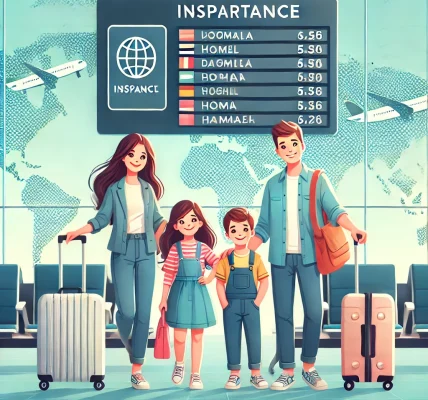Introduction
When planning an international trip, obtaining the right visa is a crucial step. Many travelers are surprised to learn that travel insurance is often a mandatory requirement for visa applications. Countries, particularly those in the Schengen Zone, require proof of travel insurance that meets specific criteria before issuing a visa. But is travel insurance truly necessary, and what role does it play in the visa process?
In this guide, we will explore why travel insurance is often required, which visas mandate coverage, what policies should include, and tips on selecting the right plan to ensure a smooth visa application.
Why Do Some Countries Require Travel Insurance for Visa Applications?
Several governments enforce travel insurance requirements to protect travelers and their local healthcare systems. Here’s why:
1. Ensuring Travelers Have Medical Coverage
- Medical emergencies abroad can be expensive, and governments want to ensure travelers do not become financial burdens.
- Mandatory insurance guarantees access to necessary medical treatment without relying on public healthcare systems.
2. Covering Repatriation and Evacuation Costs
- If a traveler needs emergency medical evacuation or repatriation, insurance covers these costs, which can be extremely high.
- Governments want assurance that visitors can be transported back home if necessary.
3. Protecting Against Unexpected Trip Interruptions
- Unexpected events such as trip cancellations, natural disasters, or personal emergencies may require immediate return home.
- Travel insurance ensures travelers can recover costs associated with interrupted trips.
4. Preventing Strain on Local Resources
- Without insurance, tourists who fall sick or face emergencies may require government aid or hospital treatment at taxpayers’ expense.
Which Visas Require Travel Insurance?
While not all visa applications require travel insurance, several countries and visa categories mandate proof of coverage. Here are some of the most common ones:
1. Schengen Visa (Europe)
- Travelers applying for a Schengen Visa (for short stays in Europe) must have insurance covering:
- Minimum medical coverage of €30,000.
- Coverage for all Schengen countries.
- Inclusion of emergency medical treatment, hospitalization, and repatriation.
2. Student Visas
- Many student visas require health and travel insurance for the duration of the stay.
- Countries like Australia, Canada, and Germany require student insurance plans.
3. Work and Long-Term Visas
- Some work visas require proof of international health insurance, especially for expats.
- Long-term visas (e.g., digital nomad visas) often include health insurance as a prerequisite.
4. Tourist Visas in Select Countries
- Countries such as the UAE, Russia, and Turkey mandate travel insurance for certain visa categories.
- Some destinations require travelers to purchase local insurance before entering the country.
What Should a Travel Insurance Policy Include for Visa Applications?
If your visa application requires travel insurance, ensure the policy includes:
1. Adequate Medical Coverage
- Coverage should meet or exceed the country’s minimum medical expense requirement (e.g., €30,000 for Schengen Visa).
2. Emergency Evacuation and Repatriation
- Policies should include medical evacuation and repatriation to the home country in case of serious illness or death.
3. Coverage Duration Matches the Visa Validity
- The policy should cover the entire duration of your stay as stated in your visa application.
4. Hospitalization and Outpatient Treatment
- Insurance should include coverage for hospital stays, doctor visits, and prescribed treatments.
5. Trip Cancellation and Interruption
- Though not always mandatory, coverage for trip cancellations due to emergencies adds financial security.
6. Insurance Provider Recognized by the Embassy
- Some embassies require insurance from approved or internationally recognized providers.
How to Select the Right Travel Insurance for Your Visa Application
1. Check Visa Requirements on the Embassy Website
- Each country has different regulations, so verify insurance specifications before purchasing a policy.
2. Compare Plans from Reliable Insurers
- Look for providers specializing in visa-compliant travel insurance, such as Allianz, AXA, and World Nomads.
3. Ensure the Policy Covers Your Entire Trip Duration
- Some embassies reject applications if the policy does not cover the exact travel dates.
4. Choose a Policy with Fast Documentation Access
- Some insurance providers issue instant policy certificates needed for visa submission.
5. Opt for Refundable Policies in Case of Visa Denial
- Some insurers allow cancellations and refunds if your visa is denied.
Common Mistakes to Avoid When Buying Travel Insurance for a Visa
1. Purchasing Incomplete Coverage
- Some travelers mistakenly buy policies without repatriation or hospitalization coverage, leading to visa rejection.
2. Not Matching Policy Dates with Travel Plans
- Ensure your insurance coverage period aligns with your visa dates to prevent rejection.
3. Using an Unrecognized Insurance Provider
- Embassies often require policies from reputable, internationally recognized companies.
4. Forgetting to Carry the Insurance Certificate
- Always have a printed and digital copy of your policy when attending your visa appointment.
What Happens If You Don’t Have Travel Insurance for a Visa Application?
If travel insurance is mandatory for your visa and you fail to provide proof, your application may be rejected. In some cases, travelers may enter a country without insurance but risk paying out-of-pocket for medical expenses, which can be financially devastating.
Conclusion
Travel insurance plays a crucial role in visa applications, ensuring travelers meet medical and financial obligations while abroad. Whether applying for a Schengen Visa, student visa, or long-term residency permit, selecting the right policy is vital for a hassle-free approval process.
By researching embassy requirements, comparing policies, and choosing a recognized provider, you can secure travel insurance that not only helps you obtain a visa but also provides peace of mind during your journey.




